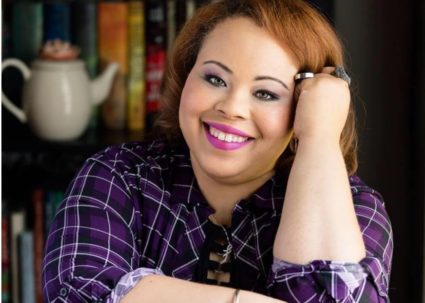
Black authors knew they were being paid less. This hashtag revealed how large the gap really is
In recent days, hundreds of authors have shared how much they were paid with the hashtag #PublishingPaidMe, a push to reveal the economic disparities between black and non-black authors.
Young adult author L.L. McKinney said she and fellow author Tochi Onyebuchi, both of whom are black, said they wanted non-black writers to share their advances — the amount a publisher will pay for a book before it's released — to open up an "uncomfortable conversation regarding numbers."
Let's do it. Let's have the conversation. https://t.co/XsHB9muIMk
— LL McKinney (@ElleOnWords) June 6, 2020
If you'd like to contribute anonymously with what #PublishingPaidMe, we have a survey for you. https://t.co/L0jdEDCyPX
— Tochi Onyebuchi (@TochiTrueStory) June 7, 2020
That conversation isn't necessarily new within the publishing world, McKinney told the PBS NewsHour's Jeffrey Brown. But once non-black authors shared their book advances, the disparity became plain.
"We knew it was there, and we knew it was big, but we didn't know it was that big," she said.
Prominent black authors also joined the conversation, highlighting the low book advances they received. Acclaimed novelist Jesmyn Ward wrote on Twitter that she and her agent "fought and fought" for a $100,000 advance for her third novel, "Sing, Unburied, Sing," even though her 2011 book "Salvage the Bones" had won the National Book Award for fiction. Ward said she received about $20,000 for "Bones." "While that new sale was a healthy increase on the old deal, it was still barely equal to some of my writer friends' debut novel advances," she tweeted. "Sing" also won the National Book Award.
Even after Salvage the Bones won the NBA, my publishing company did not want to give me 100k for my next novel. My agent and I fought and fought before we wrestled our way to that number.
— Jesmyn Ward (@jesmimi) June 8, 2020
Some non-black authors shared advances that far surpassed $100,000. Lydia Kiesling, who is white, wrote on Twitter that she received a $200,000 advance for her 2018 literary debut "The Golden State." Chip Cheek, who is also white, tweeted that he received a $800,000 advance for his debut book, a sum that changed his life, he said, adding: "I'm still in shock about it. But I'm more shocked to see the numbers from writers of color like the extraordinary Jesmyn Ward. I hope this movement begins to change things."
#PublishingPaidMe an $800k advance for my debut, which changed my life. I'm still in shock about it. But I'm more shocked to see the numbers from writers of color like the extraordinary Jesmyn Ward. I hope this movement begins to change things.
— Chip Cheek (@ChipCheek) June 9, 2020
Author N.K. Jemisin, who won the Hugo Award recognizing the best science fiction and fantasy writing three years in a row, noted that advances reflect what the publishing industry believes readers will like. Jemisin, who is black, said she received $25,000 for each of her books in her award-winning "Broken Earth" trilogy. In a series of tweets, she likened the advances to an "indicator of 'consumer confidence.'" And racism can affect that confidence, she added.
McKinney said advance money highlights the publishers' view of what is "the default for the universal story, and then what they consider 'niche' stories." Black stories are often seen as "niche," she said.
Every four years, children's book publisher Lee & Low Books releases a survey on diversity within the publishing world's workforce. This year's survey found that diversity remained largely unchanged, with 76 percent of employees being white.
McKinney spoke with Jeffrey Brown about what she thinks is driving the disparities and what lasting change she'd like to see from publishers.
The interview has been edited for length and clarity.
Tell me how this got started.
It's a conversation that we've been having in publishing for a while now, but it was mostly black authors having it amongst ourselves, having it with allies here and there. It's never been as big as it is now. And with everything that's happening in the world, the hashtag #amplifyBlackvoices happened. And it was this bittersweet thing where it was like, "O.K., so now black authors are getting support that we should have been getting." But it's on the heels of violence against black people. This is what it took for y'all to hear us and see us.
And so, Tochi Onyebuchi tweeted that if we're going to have this equality talk in publishing, then white authors, non-black authors, you're going to have to have the difficult and uncomfortable conversation regarding numbers, what you're making. And his tweet got a lot of attention and engagement. People were retweeting it. They were liking it. They were responding to it, saying, "Yes, let's do this. Yes, I want to be part of it." But no one was actually saying anything.
So I got frustrated. I retweeted his tweet and was like, "Come on, y'all. You are saying you want to do it. You're engaging with it. You're entertaining it. But no one's actually saying anything." And then I tweeted, "Do you need a hashtag? Here's a hashtag: #PublishingPaidMe. Go. Please start talking." And I guess that did it, and people started adding to it. We had a few brave folk at the beginning, and after that, it slowly snowballed. And now here we are.
You focused on advances. And for those who don't really know the publishing industry, how it works financially for authors and publishers, explain why you focused on advances. Why does that give a window into the way publishing works?
Advances are what the author is paid, pre-taxes, pre-giving the percentage to the agent or whatever, in order for the book to be published. And it's against future earnings. It's not really free money or anything like that. You have to earn that money back for the publisher in order to start getting royalties. So it's an advance on royalties.
I focused on this because, very often, this advance has a lot to do with how well the publisher thinks the story will do. And a lot of that has to do with this idea of a universal story. If a story is more universal, then more people will have access to it. And this highlights what publishing views as the default for the universal story, and then what they consider "niche" stories. Black stories are "niche," even though the largest reading demographic is black women and girls. So, even in that, there is a lie. It's just traditionally been what is considered the majority, which is white people.
This is a kind of window to show the kind of thinking — publishing is a business, right? So they're thinking about how we're going to make money, what books are going to sell. But it's the mindset that you're questioning behind that.
Yes, because if, for me, if it was truly about money, then wouldn't you be marketing to the largest reading demographic? No, you're marketing to the demographic that
A lot of prominent authors responded to you. Were you surprised?
I was surprised in a way that I don't think people expected me to be. I knew that there was a disparity. It was a silent secret, but not so secret in publishing — like, we knew. But there's a difference between knowing and knowing. So the hashtag allowed for us to see it. I didn't realize how large the disparity was. We knew it was there, and we knew it was big, but we didn't know it was that big. And so this also offered the proof. Because as often as we talked about it, it would be this idea of, "Well. You're just saying that. You're making it up. Can you prove it?" And now he can because people are revealing the numbers. So I'm surprised at how big it got, how quickly it got that way. And at just how large the disparity is. That there was a disparity was not at all surprising to me.
I look at some very prominent names — people we've had on our program, certainly Jesmyn Ward and N.K. Jemisin — that seemed to shock a lot of people.
Yes. And N.K. Jemisin, she points out that there's a difference between, you know, like science fiction and fantasy. It's not gonna be as big as these literary giants or anything like that, because even though we've gotten to a point where there's a lot more science fiction and fantasy, it's not so niche as it used to be. It's still considered niche within the parameters of publishing.
What a lot of these conversations about #PublishingPaidMe — which are necessary! — don't get is that different genres earn wildly different amounts due to audience size. Romance and YA are huge. Literary is huge. SFF? Not so huge. Sort of the opposite of huge.
— N. K. Jemisin (@nkjemisin) June 10, 2020
They're seen that way, and therefore that drives the numbers, too.
Yes. But at the same time, you have an author, N.K. Jemisin, who's doing something that no other author has done, which is winning that award three years in a row, all three books in a series. No one else did that. She's not the first black author to do that, she's the first author period to do that. And then, of course, with Jesmyn's book, that one also shocked a lot of people because you have somebody who is so acclaimed, repeatedly, versus someone who no one knows. In a lot of cases, still don't know.
And this is how the stories are treated differently, how the voices of these authors are or are not valued, and that's what I was talking about earlier, about this idea of who gets to say that their story is universal. You have an award-winning author who is beloved by so many, right on up to presidents picking up her book, versus some people who we've never heard of because the book doesn't earn out or it flops. But then that person can turn around and get that same advance and a second chance. But then black authors, once we don't earn out or we don't bring in the numbers, or maybe we do or not, but we don't earn out a certain point, we don't get a second chance because when our books flop or fail, it's seen as a reflection on all black storytelling instead of just that one book. Whereas with white books, if that book fails, that it was that book, you get another chance.
What explains the disparities? When you look at this and try to understand what's going on, is it an overt, systemic racism you're looking at? Is it a business model that has functioned in a certain way because of who's involved for a long time without thinking about it? What do you see?
I think it's a combination of the two. You have a demographic of people who for longer than half as long as this country has been around, reading and writing was illegal for us. While people were writing books about us, we weren't allowed to read or write our own things. You would have exceptions to the rule, of course, because there are always exceptions. And then people will look at those exceptions and say, "See? You have nothing to complain about." So I think it started out more overtly than it is now. But we do still have people in high places — executives, gatekeepers — who will say black people don't read, which is a whole lie.
McKinney spoke with the PBS NewsHour about why she started that particular hashtag, how she hadn't see herself represented within the world of science fiction and fantasy, and why we need more books that go beyond the "one Black girl book for the year." Video by PBS NewsHour
As recently as 2018, this was a thing. As recently as 2019, it started to change, but there was a point where you would hear in marketing meetings — and many people of color and black people, the few who work in the industry, would talk about how they'll be in meetings, and they'll hear that putting a black face on a cover, the book won't sell. That's two, three years ago. People were saying this. So while they maybe didn't mean anything by it, it's still overtly racist.
So I don't think that the intention is as thick as it was back when we were not allowed to read or write. But the intent doesn't mitigate or lessen the effects. The effect is still the same. Whether or not you meant to step on my foot, I'm dealing with the pain of having my foot stepped on. That's the important part, is there's pain of having my foot stepped on and that needs to be rectified.
All this, of course, has taken off just in the last few days. But I'm wondering if you've had any response from people in the publishing world? And what response you and others want?
I have had, just today, not to me directly, but in general, like, meetings are being had. Penguin Random House did this long thread of how they're going to make tangible change both inside the building and with the books that they put out, initiatives and backing programs, like, "We need diverse books," and things like that. So, things are happening. But again, this is one of those things where it's like, "O.K., it's nice for you to say these things. I'll believe them when I see them." This isn't the first time. This is the first time it's gotten to be this big. So hopefully something will come of it.
Blue skies is maybe an author's union pops out of it, or maybe people start inspecting those internal biases that maybe they weren't aware of, but were still having an effect on what was done. One of the reasons I focus on advances is that money allows you space and room to breathe, to work on the next book, to build a career, because one book does not a career make. Unless, you get like a ridiculous amount of money from the royalties and it goes off, do whatever. That can make a career. You can write that book and be done. But for most of us, the next contract is the more important one, because, yes, you've got your foot in the door, but without a large enough advance, most authors still work 40 hours a week — and even less so for black authors because then you have less money to work with. So maybe you're taking on, as I've seen, some people working two jobs because they also have families that they're trying to provide for during all this. So I'm hoping that publishing takes a real hard look at itself.
READ MORE: What to read, listen to and watch to learn about institutional racism
Support Canvas
Sustain our coverage of culture, arts and literature.













